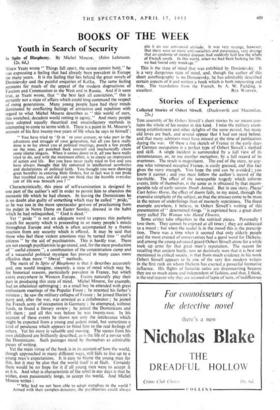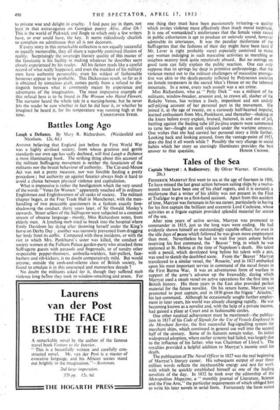Stories of Experience
THIS assembly of Sir Osbert Sitwell's short stories by no means con- tains the whole of his output in this kind. I miss the military cram- ming establishment and other delights of the same period, but many old loves are back, and several appear that I had not read before, and that many admirers must have missed at the time of publication during the war. Of these a fine sketch of France in the early days of German occupation is a perfect type of Osbert Sitwell's method and skill. A single incident is surrounded by a full view of its circumstances, or, to use another metaphor, by a full record of its overtones. The result is magnificent. The end of the story, to any- one who witnessed occupied France, is easily guessed, and this fact gives the story strength. You hope the end can be avoided ; you know it cannot ; and you must follow the author's record of the inevitable. The effect of the inescapable tragedy which informs events, little of themselves, is the same as is obtained by that incom- parable tale of early sorrow Dumb Animal. But in one story, Plague' Cart before Horse, the effect of doom fails, to my mind, through the excessive simplicity of the subject, so that the stresses come to be more in the nature of underlinings than of masterly repetitions. The finest example anywhere, I believe, in Osbert Sitwell's writing of this presentation of " determined things " is reprinted here, a great short story called' The Woman who Hated Flowers. Some critics take objection to the satirical pieces. Personally I love them. They cannot be enjoyed at all tortes ° es • they are addressed to a mood ; but when the reader is in the mood this is the prescrip- tion, There was a time when it seemed that only elderly people and the most crusted of conservatives had a good word for Dickens, and among the young advanced guard Osbert Sitwell alone for a while took up arms for that great man's reputation. The reason for recalling that ancient battle, now so decisively won that it is best not mentioned in critical society, is that from much evidence in his work Osbert Sitwell appears to be one of the very few modern writers in the first rank on whom Dickens has exerted a powerful formative influence. His flights of fantastic satire are disconcerting because they are so much alone and independent of fashion, and that, 1 think, is the real reason why they are accused of lapk of taste, of indifference to private woe and delight in cruelty. I find pure joy in them, not least in that extravaganza on Georgian poetry Alive, Alive Oh ! This is the world of Pickwick and Jingle to which only a few writers have, or ever could have, the key. It seems ridiculously churlish to complain on admittance that all is not decorum.
If every story in this remarkable collection is not equally successful or equally memorable, they all share a superbly contrived illusion of reality. Surprisingly the sovereign literary quality of this master of the fanatastic is his facility in making whatever he describes seem closely experienced by his reader. All his fiction reads like a careful record of what really happened, and even the maddest of his military men have authentic personality, even his wildest of fashionable hostesses appear to be probable. This Dickensian result, so far as it is obtained by conscious craft, comes partly from a refusal to dis- tinguish between what is commonly meant by experience and adventures of the imagination. The most impressive example of this refusal here is to be found in The Woman who Hated Flower's. The narrator heard the whole tale in a nursing-home, but he never lets the reader be sure whether in fact he did hear it, or whether he imagined he heard it, for his temperature was running high at the



































 Previous page
Previous page